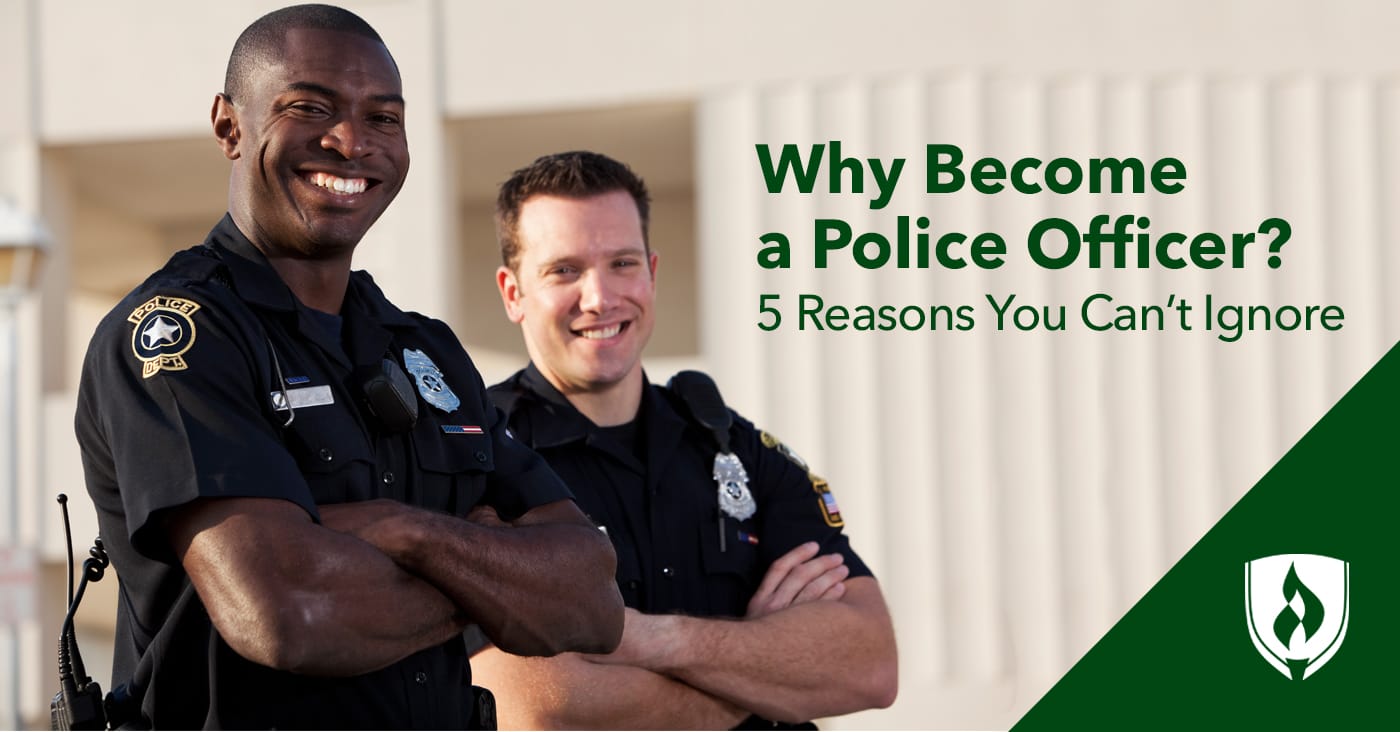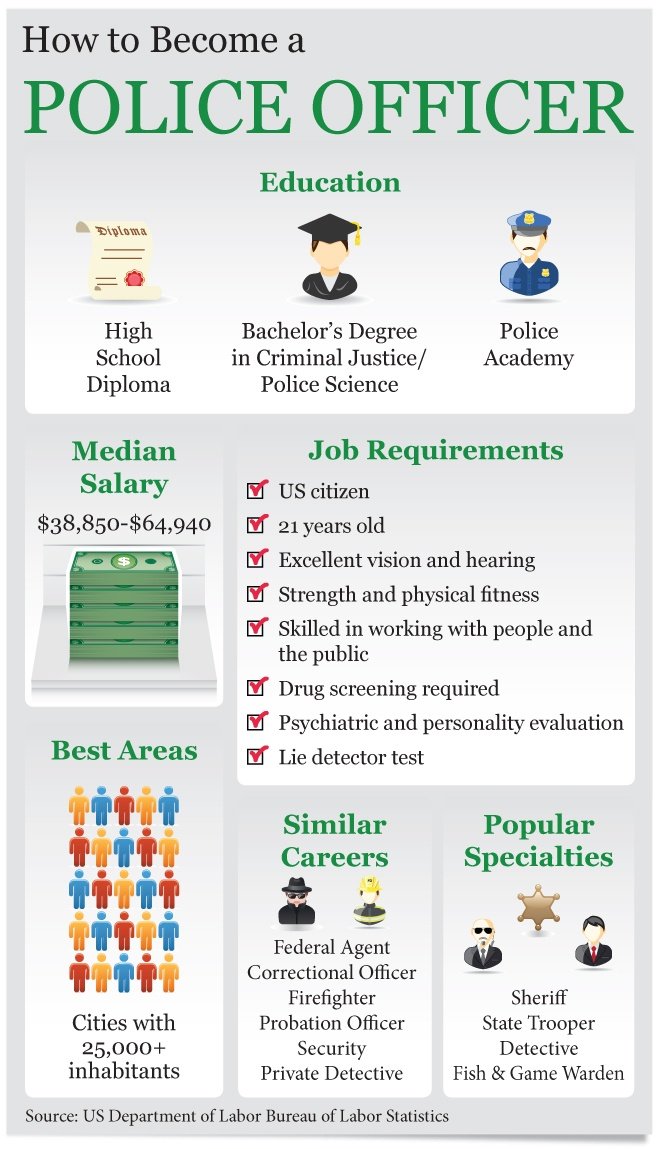Is Being A Police Officer A Good Job
There are clear advantages to working in this profession, but it comes with some of the largest downsides experienced in almost any career. As a police officer, you see some of the worst aspects of society, including domestic violence, ravages of drug abuse, and even murder. Its not just dealing with self-important speeders on the highway, but violent criminals as well. This can make policing extremely stressful, often forcing police officers to need therapy and other forms of emotional support.
But there are real advantages as well. As a police officer, you will experience pride in your job and, on occasion, the community will show its support and appreciation, which can make all the stresses worth the effort. Despite the challenges, youll know that your work makes the community a better place few careers can honestly make this claim.
Math Requirements For Police Officers
High schools require a specified number of math credits for potential graduates, so stay on track by earning good grades in math classes. Math helps future police officers by developing critical thinking and analytical skills for problem solving. Working neatly and accurately on math assignments and exams helps police officers keep organized, accurate records in the field. You may also use basic math to reconstruct auto collisions and track crime statistics.
Associate Degrees In Criminal Justice
An associate degree is a two-year program that requires at least 60 semester credits . Most criminal justice programs are actually in the 64- to 66-credit range. Of those credits, around 40% are general education requirements such as English, math, science, humanities, and other topics. Another 20% of credits are elective courses. The actual major is around 40%, or eight classes.
Because most associate degrees are meant to build into bachelors programs, the classes are, by definition, lower-level. They cover introductory material meant to be explored more in-depth in the final two years of undergraduate study.
Those classes might include the following:
- Introduction to criminal justice: You will learn who the different actors are from police officers to lawyers to judges and legislators and how they work together to form the criminal justice system.
- Communication: Learn the building blocks for writing a police report, interviewing suspects and witnesses, and deescalating tense situations.
- Judicial system: Explore the layers of the federal, state, and/or local court systems and which cases go where.
- Corrections: Examine how jails and prisons function and explore concepts such as rehabilitation and punishment.
- Research: Learn to analyze data to understand what different criminal statistics actually mean.
Don’t Miss: When Does Police Use Of Force Become Excessive Or Unjustified
What Do Related Occupations Make
If youre interested in how to become a police officer, you might also be interested in related professions. Working as a correctional officer, EMT or paramedic, firefighter, probation officer, security guard, gaming surveillance officer, game warden or firefighter might be on your radar. If thats the case, you can peruse the list of related occupations below, which includes average salaries:
What you earn depends on where you live, including the region, state or city. To help determine what you can expect to make in your particular area, our handy salary comparison tool can help.
How Does Police Academy Training Work

No matter which program you choose, before beginning work at a police department, you will have to enter a police academy for formal training. This training will consist of various elements that prepare you for life as a police officer, including training it the classroom, field training that walks you through the rigors of the day-to-day work, and in-service training that allows you to begin working with the public on a probationary basis. Heres more about police academy training:
Classroom education
The classroom curriculum will focus on a variety of subjects, ranging from the law itself to administrative and department procedures. Cadets will also learn not just what the law is, but how to apply it in the real world. For example, a police officer may know that probable cause is required for a warrant to conduct a search, but what about the exceptions where a warrant isnt needed? Or what should the officer do or say if an individual contests the validity of the warrant? Much of this classroom training will be necessary before field training can take place or to put the hands-on skills into context.
Field training
In-service training
You May Like: Can I Listen To Local Police Scanners Online
Emphasize Related Work Experience
Explaining how your work history has prepared you for police work is very important. Talking about your military service can give you an edge over civilians who are applying. Employers value the skills that veterans bring to the police force such as mental strength, sense of duty and unwavering courage. Other directly related experiences include full-time or volunteer fire fighting, driving an armored car, sleuthing as a private detective or working as a security guard. If you are at least 20 years old, consider volunteering for the police reserves, in which you will receive introductory law enforcement training. Joining the army reserves is an excellent way of acquiring skills and standing-out in the application process.
Sponsored Online Law Enforcement Degrees
Criminal Justice & Criminology
Another degree field that will be helpful is criminology. This field of study takes a broad-range, science-based approach to crime, looking at crime statistics in relation to frequency, causes, demographics, and more. This is an academic discipline heavily rooted in science , so a curious mind and an aptitude for numbers is helpful. When complete, this degree is useful for career advancement, as it can be applied to the big-picture issues that law enforcement leaders need to tackle.
Although sharing many similarities to criminology, criminal justice focuses on navigating the societal systems that have been set up to stop crime, punish criminals, and reduce future instances. Basically, a criminal justice degree gives you a thorough understanding of law enforcement, the court system, and corrections. Once again, this degree is extremely useful for future advancement, as it gives a strong understanding of the overall crime-prevention efforts in the United States. Its beneficial for people who want to shift horizontally in law enforcement, moving into areas such as victim support or rehabilitation.
Don’t Miss: What Are The Requirements To Become A Police Detective
Job Outlook For Ontario Police Officers
The labour market conditions for police officer jobs are currently Average. This indicates that these jobs are not difficult to find nor are they necessarily in abundance. Salaries have increased at a slower rate compared to jobs rated as Above average, but faster than those rated as Below average.
According to the Job Bank, employment growth and retirement will lead to a moderate number of new positions. In other words, the balanced labour market from 2016 – 2018 means there have been as many jobs available as there have been job seekers.
Law Enforcement Or Policing
One common degree specialty for those interested in a career in policing is law enforcement. Degrees in law enforcement are offered at the certificate, associate, bachelors, and masters levels. Students in law enforcement and policing degree programs learn about the history of law enforcement, focusing on an ethical approach to policing, the application of law, due process, tactical strategies, law enforcement technology, and the proper use of force. Law enforcement and policing degrees may be pursued in a traditional format as well as in a hybrid or online format. Courses common to a degree in law enforcement include Physical Training/ Use of Force, Constitutional Law, Police Report Writing, Firearms, Law Enforcement Leadership, and Traffic Law. Courses taken at the police academy after being hired as an officer are typically similar to those found in law enforcement or policing degree programs.
Recommended Reading: Where Can I Obtain A Police Report
Understanding Of Basic Science
Like math, science class requirements help potential police officers learn critical thinking and analytical skills. Police officers interested in forensics, detective work and crime analysis benefit from chemistry classes, human anatomy and physiology. These classes incorporate scientific principles with hands-on lab work.
How To Become A Police Officer: Your Step
By on 02/10/2020
There are plenty of Hollywood movies out there that detail the rigorous physical training involved in becoming a cop. You might even be able to picture the obstacle courses, shooting ranges and tactical scenario training rooms. These are all important elements of police officer trainingbut they only make up one portion of the process.
Given the high level of responsibility and trust afforded to law enforcement, the standards for becoming a police officer are higher than what youll likely find in many careers. The specific standards and process will vary slightly based on the state, county or town youre applying to work in, but there are a few universal requirements to become a police officer you should be familiar with.
If youre wondering how to become a police officer, youre in the right place. Keep reading for a high-level breakdown of the path to pursuing a career in law enforcement.
Also Check: How The Police Track Cell Phones
How To Become A Police Officer In Ontario
The police officer occupation is one of the few jobs where education is not a barrier to earning potential. According to the Ontario government, the average annual police officer salary in Ontario with a high school diploma , earned $106,788 in 2016 compared to police officers with a bachelors degree who earned $106,543. Interestingly enough, degree holders earned $245/year less.
This is great news for those who only have a high school diploma but are looking for a fulfilling career with high-earning potential.
While education barriers are relatively low, becoming a police officer in Ontario is not a job that just any high school graduate can land.
In this article, we outline key information to help you land your dream job including:
Police Officer Degree Levels

There are many degree options for prospective and current police who are interested in furthering their education. As previously mentioned, a successful policing career does not necessarily require a college degree, but pursuing a degree can benefit your career as a police officer not only by helping you get hired but also by putting you in a better position to be promoted and/or move into a supervisory position. Before we look at the degree majors available for those interested in police education, lets look at the police officer education levels available.
You May Like: What Are The Requirements For Police Academy
Bachelors Degree In Law Enforcement
A law enforcement degree at the bachelors level typically takes four years to complete and can include many different topics or subjects. There are prototypical degrees such as criminal justice, criminology and law enforcement studies. But there are other majors that can hold police officers in good stead. For example, graduates with a degree in accounting are excellent candidates for a career in white collar crime investigations, while computer science majors can have an advantage if theyre interested in pursuing a career in computer forensics or cyber crimes.
Those in a bachelors degree program in a law-related field can expect to find courses like these:
Police Ethics
What Should I Major In To Become A Police Officer
One of the noblest callings you can answer is that of protecting your community, and one of the most direct ways of doing that is by becoming a police officer. Those who aspire to work in the criminal justice field will find a variety of settings to explore, in addition to that of being a patrol officer, including security, forensic science, computer technology, and investigations.
You May Like: How Do You Sue The Police Department
Criminal Justice Classes Are Key
Criminal justice classes can also fulfill elective unit requirements for high school graduation. Not all schools offer criminal justice, but taking this class helps future police officers gain valuable knowledge about the court systems, effectiveness of law enforcement, laws protecting citizens and the rights of suspects.
Seek Education And Preparation
In most local and state police departments, a high school degree or equivalent fulfills the police education requirements for joining the force. While there aren’t police colleges, a college degree can benefit a candidate, and a minority of agencies requires a two-year or four-year college degree. For example, Boston College as a Criminal Justice undergraduate degree that provides a foundation for this job field. At the federal level, the Federal Bureau of Investigation’s police officers, as well as its special agents, must own a four-year college degree. A level of higher education in a police-related discipline such as criminal justice helps officers gain promotions and earn higher salaries after they are on the force.
Recommended Reading: How To Find Out Police Report
Get The Right Police Education & Training
There was a time when becoming a police officer was as simple as graduating high school or earning your GED, then attending a short training academy before diving into on-the-job training. And though those opportunities do still exist, especially in smaller departments, most departments have raised their standards of education to at least two years of post-secondary work. This means pursing an associate degree in law enforcement or a related field, such as criminal justice, criminology, or police science should be the first option to consider. The associate degree can then serve as a stepping stone to the bachelors degree, which then leads to graduate degree options.
However, other routes to the profession do exist. In addition to the on-the-job training after completing academy training, there is also the military option. Those who work as military police or in a similar capacity while serving their country can be perfectly suited to move into a police force after their military time is up. Lets take a look at the options.
Associate Degree in Law Enforcement
Bestfor? Those who want to stand outagainst the competition, or need a basic college degree to apply fora particular job opening.
Bachelors Degree in Law Enforcement
Best for? Those who have the time and financial resources to earn a four-year degree, want to work in federal law enforcement, or anticipate future professional advancement.
Masters Degree in Law Enforcement
Military experience in lieu of a degree
What Degree Should I Get To Be A Police Officer
-
Degree Finder
Being a police officer requires extensive training, a good education and a willingness to enforce the law. For many high school students who eventually want to become police officers, the path forward to get into this career is a bit mysterious. Should aspiring police officers go to college? If so, what level of degree will they need to be a cop, and what major should they study in preparation for this career?
IMAGE SOURCE: Pixabay, public domain
You May Like: Can You Pull Up A Police Report Online
Types Of Police Officer
When you work as a police officer, you will be in a setting where rank and seniority make a big difference. Like the military, there is a direct hierarchy of authority whereas a private-sector boss can make a request, the head of a police department gives an order, and its your duty to follow these orders.
The exact structure of a police department can vary by region and size, but it generally starts with police officers, the most common rank. These are the professionals who complete ground-level duties of patrol and emergency response, forming the backbone of law enforcement across the country.
Next in rank are detectives, who perform crime scene investigations and work on individual cases.
From there, the structure of a police force, from lowest to highest rank, looks something like this:
- Corporal Essentially an entry-level supervisor, often in charge of a small group of administrators.
- Sergeant First-line supervisors, usually overseeing a group of officers and detectives.
- Lieutenant In charge of a group of supervisors.
- Captain Commanders of entire districts and units.
- Staff Inspector Responsible for overseeing large units and multiple districts.
- Chief Inspector Commanders of a bureau or large group of units.
- Deputy Commissioner In charge of large sections of departments and districts.
In other cities, the police department can be headed by a chief, and there are other rankings and titles that can be found depending on the region.
Homeland Security And Emergency Management

Studies in homeland security and emergency management often combined are ideal for preparing students for careers protecting the nation and handling emergency situations. Typically, homeland security and emergency management majors complete courses in domestic security management, international and domestic terrorism, crisis management, disaster management, network defense, information security and border-transportation security. While some of the coursework in this major pertain to police officer roles, such as classes in conflict negotiation and interviewing and interrogation, many of these courses prepare students to work in other government agencies, like the FBA, the Secret Service, FEMA and the TSA.
Also Check: Can I File A Restraining Order At The Police Station
Hearing And Eyesight Requirements
Officers may be required to demonstrate a particular level of acuity with their seeing and hearing. As an example, the City of Scottsdale, Arizona, requires officers to have 20/20 vision or better, with certain allowances made for the use of contact lenses or glasses. Additional requirements include an ability to discern different colors and demonstrate strong peripheral vision.
Meanwhile, the City of San Diego requires âpure tone threshold testing for each ear separately at 500, 1000, 2000, 3000, 4000, and 6000 Hz.â Special considerations are mentioned for officers who wear hearing aids, specifically requiring them to demonstrate a high level of speech comprehension.